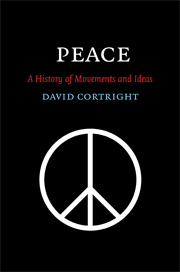9 - Religion
Published online by Cambridge University Press: 05 June 2012
Summary
Throughout the ages religion has served as both catalyst to conflict and inspiration for peace. The ambivalence of the sacred, as Scott Appleby termed it, is one of history's great enigmas. Many of the most vicious and intractable wars have been cloaked in religious garb. Yet religion also provides valuable resources for peacemaking. Within each of the great religions there is “a moral trajectory challenging adherents to greater acts of compassion, forgiveness, and reconciliation,” Appleby wrote, an “internal evolution” that offers hope for religiously inspired peacemaking.
All major religions have imperatives to love others and avoid the taking of human life. In Buddhism the rejection of killing is the first of the Five Precepts. Hinduism declares “the killing of living beings is not conducive to heaven.” Jainism rejects the taking of any form of life: “if someone kills living things … his sin increases.” The Qur'an states “slay not the life that God has made sacred.” The Bible teaches “you shall not murder.” This reverence for life and desire to avoid harm is the first of what theologian Mark Juergensmeyer identified as the three major aspects of nonviolence within world religions. The second is the ideal of social harmony and living peacefully with others, frequently emphasized in the Old Testament and the Qur'an. Third is the willingness to sacrifice and suffer for the sake of expiating sin and avoiding injury to others, which is common in the Abrahamic traditions.
- Type
- Chapter
- Information
- PeaceA History of Movements and Ideas, pp. 183 - 210Publisher: Cambridge University PressPrint publication year: 2008

